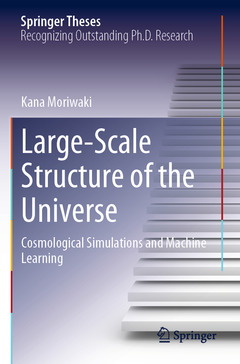Description
Large-Scale Structure of the Universe, 1st ed. 2022
Cosmological Simulations and Machine Learning
Springer Theses Series
Author: Moriwaki Kana
Language: English
Subjects for Large-Scale Structure of the Universe:
Publication date: 11-2023
120 p. · 15.5x23.5 cm · Paperback
Publication date: 11-2022
120 p. · 15.5x23.5 cm · Hardback
Description
/li>Contents
/li>Biography
/li>Comment
/li>
Line intensity mapping (LIM) is an observational technique that probes the large-scale structure of the Universe by collecting light from a wide field of the sky. This book demonstrates a novel analysis method for LIM using machine learning (ML) technologies. The author develops a conditional generative adversarial network that separates designated emission signals from sources at different epochs. It thus provides, for the first time, an efficient way to extract signals from LIM data with foreground noise. The method is complementary to conventional statistical methods such as cross-correlation analysis. When applied to three-dimensional LIM data with wavelength information, high reproducibility is achieved under realistic conditions. The book further investigates how the trained machine extracts the signals, and discusses the limitation of the ML methods. Lastly an application of the LIM data to a study of cosmic reionization is presented. This book benefits students and researchers who are interested in using machine learning to multi-dimensional data not only in astronomy but also in general applications.
Introduction.- Observations of the Large-Scale Structure of the Universe.- Modeling Emission Line Galaxies.- Signal Extraction from Noisy LIM Data.- Signal Separation from Confused LIM Data.- Signal Extraction from 3D LIM Data.- Application of LIM Data for Studying Cosmic Reionization.- Summary and Outlook.- Appendix.
Kana Moriwaki is an assistant professor in the School of Science at the University of Tokyo. She received her Ph.D. from the University of Tokyo in 2022 and was awarded the University of Tokyo President's Grand Prize. Her interest lies in cosmological simulations and the application of machine learning techniques for astronomical data.
Nominated as an outstanding Ph. D. thesis by The University of Tokyo
Offers a novel technique based on machine learning for analysis of astronomical observational data
Develops conditional generative adversarial networks using physical information in data

